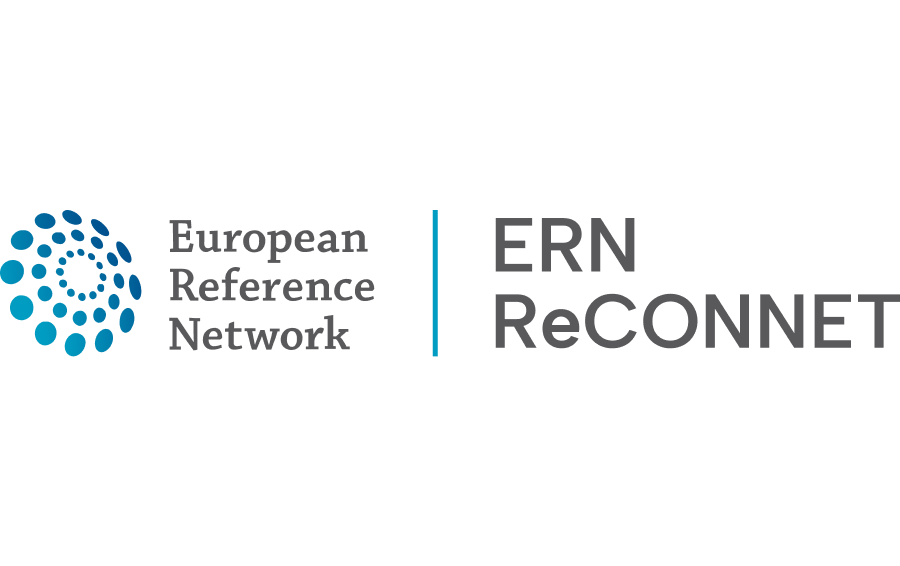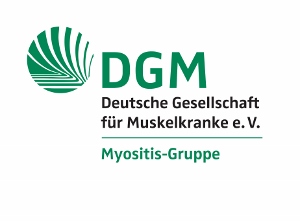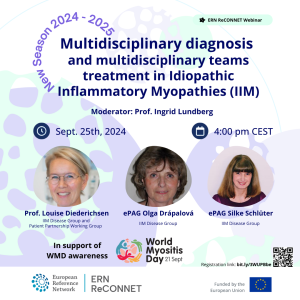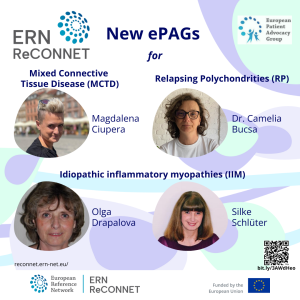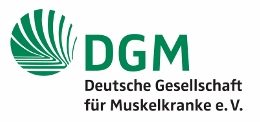ERN ReCONNET
ePAGs
Silke Schlüter
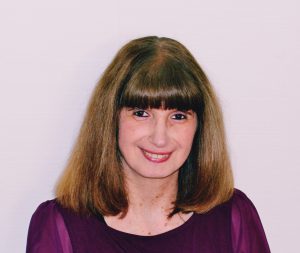 Mrs. Silke Schlüter is an ERN ReCONNET ePAG representative for Idiopathic Inflammatory Myopathies (IIMs).
Mrs. Silke Schlüter is an ERN ReCONNET ePAG representative for Idiopathic Inflammatory Myopathies (IIMs).
Silke takes part in regularly meetings for the ePAG’s and for the IIM disease group members. She also joins meetings with the ERN ReCONNET coordination team. Silke Schlüter is involved in creating content for webinars, congress programs, aspects for Red Flags in IIM and surveys.
Silke is the chair of the “Myositis-Gruppe” (German myositis group) within the “Deutsche Gesellschaft für Muskelkranke e.V. – DGM”. She is also board member of the German Network “MYOSITIS NETZ e.V.” and the “International Myositis Society – iMyoS” additional she is a member of the ERN EURO-NMD muscle working group.
Silke is listed as a patient representative for national and international projects dealing with either myositis or neuromuscular and rheumatic diseases in general (ENMC, IMACS, MIHRA).
Silke worked full-time as a state-certified educator (partly in a Kindergarten). In 2004, physical symptoms of her myositis had increased so much that she was retired. Silke Schlüter is married, has an adult daughter, and lives Bad Salzuflen (Germany).
Being part of this network enables exchange with international experts (patient representatives & clinicians) on the same clinical picture, but also on different clinical patterns. Similarities and differences between the clinical pictures help with detailed criteria for diagnosis, treatment and, above all, a better understanding of the individual diseases.
Silke Schlüter has only recently joined ERN ReCONNET as ePAG and has so far mainly been involved in the planning of numerous activities. Silke Schlüter would like to work with the other ePAGs to make patients more visible and audible, to (better) educate patients, clinicians, practitioners, etc. about the various clinical pictures and to discuss and create uniform criteria for diagnoses and treatments and international registries.
Those who fight can lose, those who don’t fight have already lost.”
ERN ReCONNET WEBINAR SEASON 2024 – 2025
MULTIDISCIPLINARY DIAGNOSIS AND MULTIDISCIPLINARY TEAMS TREATMENT IN IDIOPATHIC INFLAMMATORY MYOPATHIES (IIM)
Speakers Prof. Louise Diederichsen, ePAGs Olga Drápalová and Silke Schlüter, moderator Prof. Ingrid Lundberg.
Sept. 25th, 2024 – 16.00 CEST.
ERN ReCONNET is honored to welcome new ePAG Advocates that will greatly contribute to our projects, actions, and initiatives.
Welcome Olga Drapalova from Czech Republic and Schlüter Silke from Germany as new patient representative for the Idiopathic Inflammatory Myopathies (IIM) disease group, Magdalena Ciupera from Poland representative for the Mixed Connective Tissue Disease (MCTD), and Dr. Camelia Bucsa from Romania representing Relapsing Polychondritis (RP).
Happy to have you on board and congratulations for your new roles in ERN ReCONNET!
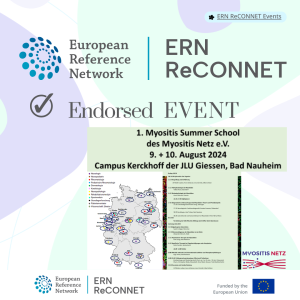
Silke participated to the first Myositis Summer School of the Myositis Network Germany that took place at the Kerckhoff Campus of the JLU Gießen in Bad Nauheim (Germany). This important initiative was endorsed by the ERN ReCONNET.
 ERN RECONNET WEBINARS ON IIM ARE FREELY AVAILABLE.
ERN RECONNET WEBINARS ON IIM ARE FREELY AVAILABLE.
The “Deutsche Gesellschaft für Muskelkranke e.V. – DGM” is focused on support of people with neuromuscular diseases and was established 1965.
Its goals are: Promoting self-determination and inclusion in society and improving the quality of life of people with a neuromuscular disease. The goals and tasks are geared towards the needs of those affected and take into account the current social and socio-political framework conditions. The DGM networks nationally and internationally with the organizations that are important for this work.
The DGM sees itself as representing the interests of all people with a neuromuscular disease. Its mission is to promote research activities and to support those affected and their families in their everyday lives with a muscle disease.
The DGM informs the public, those affected and their relatives about neuromuscular diseases, gives advice for those affected and their relatives as well as possible assistance in all areas of life, for example at school, at work and in rehabilitation and represents the interests of people with neuromuscular diseases in the health and socio-political field.
In addition to providing support for patients and their relatives, the DGM‘s research support is intended to help diagnose, treat and perhaps even cure neuromuscular diseases in the future.
The DGM is networked with clinicians who are involved in the ERN networks, one patient org representative was sent to the ERN ReCONNET as an ePAG.
Through the cooperation between the DGM and the clinicians at ERN ReCONNET, strengths are pooled, and knowledge is exchanged. Guidelines and criteria (diagnosis, treatment, etc.) can be standardized at European level; by instance, the participation of ePAGs contributes to the development of such aspects from the patient’s perspective. Clinicians and patient representatives work on an equal footing for the benefit of the patients affected.
Motto of this patient organization is…
Schwache Muskeln brauchen starke Helfer (Weak muscles need strong partners)!

